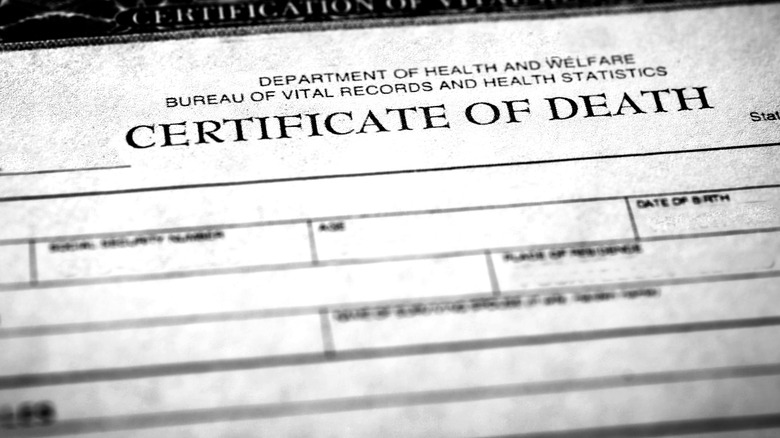The Chicago Man Who Faked His Death To End His Cellphone Plan
One modern trope pertaining to technology is that what is supposed to make our lives easier, in fact does the opposite. Cellphone company scamming is a known issue, and companies often push profits to their max by cutting corners on customer service and purposely creating difficult hoops to jump through when you attempt to cancel a plan, according to Harvard Business Review.
Chicago area man Corey Taylor was frustrated and fed up with the poor quality of his cellphone service, per The Seattle Times. There were dropped calls and the phones themselves weren't measuring up. It was time for him to move on to a better company. But for the pleasure of freeing him from his poor service, Verizon wanted Taylor to pay $175 for leaving his contract.
To avoid the superfluous $175 cancellation fee, Taylor took an extreme approach. When he read more about his predicament, he found death was a sure-fire way to end a phone contract. He sought the services of a "Chicago consultant," according to The Seattle Times. No, he didn't hire a mafia hitman to kill him. Taylor took the more reasonable approach and had a faux death certificate crafted, then had someone fax it to Verizon.
Fake it till you can pay it
It's unknown how many people try to fake their own deaths, also called committing pseudocide. (Some celebrities may have faked their deaths, too.) High-level private investigators hired by insurance agencies have divulged finding dozens of cases a year, via Vox. Even if the number of individuals caught in the attempt was recorded, it would still be subject to survivorship bias. In other words, it's like spotting a toupee. You only know of the ones you can see. It could be impossible to know how many succeed in their concealment. When we do hear of people staging their own death, it's often because they failed, sometimes comically.
There are a couple of quirky examples of how social media was used to attempt pseudocide. One family was mourning the sudden death of their daughter when she walked in the front door in time for dinner, via The Bettota Advocate. Jan and Toby O'Brien were shocked because they had just read a story of their daughter's death on Instagram.
The daughter, whose name was concealed by The Bettota Advocate, explained, "I didn't have a choice." Having her best friend craft a fake death announcement on Instagram was seemingly preferable to canceling her Fitness First membership early. "It's like making an unbreakable vow," she described of the ironclad contract.
Feeling helpless to companies
Fitness First explained not only does the member have to be declared dead to get released from their contract, but they have to be dead at least three days, per The Bettota Advocate. According to the establishment, this oddly specific stipulation with vaguely Christian undertones was a condition of their membership contract. "As Ms. O'Brien has only been dead for 24 hours we will not be releasing her yet," the gym spokesman stated, imaginably while stroking a white cat. The person who alerted the gym to the ruse was not identified.
Feeling helpless can narrow one's perspective when searching for solutions. It's likely most people who attempt to fake their own death are doing so for the first time. "They aren't always criminal masterminds," explains Elizabeth Greenwood, author of the book "Playing Dead: A Journey Through the World of Death Fraud," via Vox. Financial troubles are a frequent motivation for these individuals. Other common motivations include avoiding jail or escaping from domestic abuse. All of these situations contain real components of helplessness.
While Corey Taylor still had to pay Verizon, he might have inspired some bad press for the phone company. The advertisement agency Droga5 didn't admit to it, but it's likely they were at least familiar with Taylor's story when they wrote their Sprint Super Bowl ad. The 2017 commercial took a comical shot at Verizon regarding their hiked up bills, via Business Wire.
Sprint pokes fun at Verizon
The 2017 Sprint Super Bowl advertisement features a man placing a mannequin in the driver's seat of an SUV, via YouTube. As he pushes the car off a cliff, a legal disclaimer at the bottom of the screen reads, "Do Not Attempt." The man explains to his kids that he had to fake his death to get out of his phone bill. When asked if faking your death was illegal, the father replies to his son, "What, are you a cop?" Matt Ian, the executive creative director for Droga5, the advertisement agency hired by Sprint, said, "We wanted to capture the helplessness of being trapped in a cycle of insane fees ... ," via Business Wire.
Sprint merged with T-Mobile in August 2020, according to CNN Business. A federal judge ruled that the two telecom giants could clot together to become one of the three largest wireless companies. With control of a large percentage of the market share, big wireless companies experience less pressure to keep their customers happy, per Harvard Business Review.
The reviews from frustrated customers ring true to anyone who's attempted to navigate a purposely confusing call menu. A recent review for Verizon on the site Trust Pilot reads, "Verizon should pay for my meds because of the anxiety and frustration they have caused me." Describing Verizon, another customer wrote, "Literally a nightmare company," going to state that they often have to spend at least three hours or more on the phone to contest "some extra random charge," via Trust Pilot.
The companies win
Cellphones have several ways of bilking their customers out of money. They often use a tactic in the design of their websites, contracts, and apps called dark patterns, according to Fast Company. Dark patterns obscure the options a customer could take which wouldn't benefit a company. For example, an extra fee could be selected with a light gray checkmark as a default, which the customer doesn't see before making a purchase.
We don't know how Verizon detected Corey Taylor's fraudulent death certificate, but he ended up being stuck with the bill. "In the end, I forked over the money," Taylor is quoted in The Seattle Times. "But I bet I sent a definite message about how much people hate being strapped to a cellphone that doesn't work." He didn't. While at least it hasn't gone up with inflation, Verizon's $175 cancellation fee hasn't changed. It's a higher $350 if the contract includes a smartphone, according to Verizon. It's unlikely, but one would hope Taylor's "consultant" and lawyer fees cost less than $175.
If you or someone you know is dealing with domestic abuse, you can call the National Domestic Violence Hotline at 1−800−799−7233. You can also find more information, resources, and support at their website.




